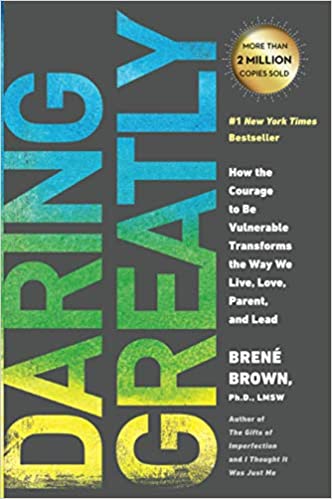
Daring Greatly
by Brene Brown
⏱ 13 minutes reading time
🎧 Audio version available
Non-verbal cues: Body language and facial expressions
When it comes to deciphering someone’s true feelings, non-verbal cues can speak volumes. Pay close attention to their body language and facial expressions, as they can reveal a lot about what they’re truly thinking.
For example, crossed arms and a tense posture could indicate that someone is closed off or defensive towards you. Avoiding eye contact or looking away when you’re speaking can also be a sign of discomfort or disinterest. On the other hand, if someone consistently maintains a relaxed and open posture when they’re around you, it’s likely a positive indication that they feel comfortable and at ease.
Facial expressions are another crucial aspect to consider. Microexpressions, which are brief and involuntary facial expressions, can provide valuable insights into a person’s true emotions. Look out for subtle signs of contempt, such as a slight curl of the lip or a raised eyebrow, as these can be indicators of underlying dislike.
Verbal cues: Tone of voice and choice of words
While non-verbal cues are important, it’s equally crucial to pay attention to the words someone uses and how they speak to you. The tone of voice can reveal a lot about their true feelings towards you.
If someone consistently uses a harsh or condescending tone when speaking to you, it’s likely a sign of dislike or resentment. They may also be dismissive of your ideas or opinions, using words that undermine or invalidate your thoughts. On the other hand, a warm and friendly tone indicates a positive attitude and a genuine liking towards you.
The choice of words can also provide insights into someone’s true feelings. Pay attention to whether they use inclusive or exclusive language when referring to you. If they consistently use “we” when discussing plans or activities, but exclude you from those discussions, it could be a subtle way of showing dislike or exclusion.
Avoidance behavior: Ignoring or avoiding interactions
One of the most obvious indicators that someone might secretly dislike you is when they consistently ignore or avoid interactions with you. They may intentionally avoid eye contact, not respond to your greetings, or make excuses to avoid spending time with you.
This behavior can be hurtful and confusing, leaving you questioning what you might have done to cause their avoidance. However, it’s important to remember that their actions are a reflection of their own feelings and not a reflection of your worth as a person. While it can be challenging, try not to take their avoidance personally and focus on nurturing relationships with those who appreciate and value your presence.
Lack of engagement: Minimal response or disinterest in conversations
Another subtle indicator that someone might secretly dislike you is their lack of engagement in conversations. They may respond with one-word answers or show disinterest by not actively participating in the discussion.
If you find that you’re consistently the one initiating conversations and putting in the effort to keep the dialogue going, it could be a sign that the other person doesn’t value your input or doesn’t enjoy talking to you. While it can be disheartening, it’s important to recognize that you deserve to be in relationships where your thoughts and opinions are valued.
Passive-aggressive behavior: Indirect or sarcastic remarks
Passive-aggressive behavior is a common tactic used by people who secretly dislike others. They may make indirect or sarcastic remarks that are meant to undermine or criticize you without being overtly confrontational.
For example, they may make snide comments disguised as jokes or use sarcasm to belittle your achievements or ideas. It can be challenging to address passive-aggressive behavior directly, as it often requires a delicate balance between assertiveness and avoiding unnecessary conflict. However, setting boundaries and calmly expressing your concerns can help address the issue and potentially improve the dynamic between you.
Exclusion: Being left out of social gatherings or activities
Exclusion is a clear sign that someone might secretly dislike you. If you consistently find yourself being left out of social gatherings or activities that you would normally be included in, it’s worth considering whether there is an underlying issue.
Sometimes, exclusion can be subtle, such as not receiving an invitation to a group outing or being left out of inside jokes or conversations. Other times, it can be more explicit, with the person making it clear that they don’t want you to be a part of certain events or activities. While it can be hurtful to experience exclusion, it’s important to remember that you deserve to be included and valued in your relationships.
Gossip and rumors: Hearing negative things about yourself from others
If you start hearing negative things about yourself from others, it could be a sign that someone secretly dislikes you. Gossip and rumors can be damaging to your self-esteem and can strain your relationships with others.
Pay attention to the source of the information and consider whether they might have a hidden agenda or a bias against you. It’s important not to jump to conclusions based solely on gossip, as it can be misleading and inaccurate. Instead, focus on building strong, genuine connections with those who support and uplift you.
Online behavior: Unfollowing or unfriending on social media
In today’s digital age, online behavior can be a telling sign of someone’s true feelings towards you. If someone unfollows or unfriends you on social media platforms, it could be a clear indicator that they have negative feelings towards you.
While it’s important not to obsess over online interactions, significant changes in someone’s online behavior should not be ignored. It’s worth considering if there has been a recent conflict or disagreement that may have triggered their decision to unfollow or unfriend you. However, keep in mind that online interactions only provide a limited view of a person’s true feelings, and it’s important to have open and honest conversations to address any issues.
Related: Are You in an Incompatible Relationship? Discover the 10 Clear Signs
Trust your instincts: Recognizing your own feelings and intuition
Sometimes, the most reliable indicator that someone might secretly dislike you is your own intuition. Trust your gut feelings and pay attention to any discomfort or uneasiness you may feel around the person.
While it’s important not to jump to conclusions based solely on your instincts, they can serve as a valuable guide when navigating your relationships. If you consistently find yourself feeling uneasy or anxious around someone, it’s worth exploring why that might be and considering whether there is an underlying issue that needs to be addressed.
Handling situations with maturity and open communication.
Discovering that someone secretly dislikes you can be challenging and hurtful. However, it’s important to handle these situations with maturity and open communication.
Instead of harboring resentment or seeking revenge, approach the situation with a calm and empathetic mindset. Consider having an open conversation with the person to address any concerns or misunderstandings. They may not even be aware that their actions are causing you distress, and having an honest conversation can help bring clarity and potentially mend the relationship.
Remember, not everyone will like you, and that’s okay. Focus on nurturing relationships with those who appreciate and value you for who you are. Surround yourself with positive influences and cultivate a supportive network of friends and loved ones who uplift you.
In conclusion, deciphering whether someone secretly dislikes you can be a complex task. By paying attention to non-verbal cues, verbal cues, avoidance behavior, lack of engagement, passive-aggressive behavior, exclusion, gossip and rumors, online behavior, and trusting your instincts, you can gain valuable insights into the true feelings of those around you. Remember to handle these situations with maturity and open communication, and focus on building strong, genuine connections with those who appreciate and value your presence.
What Is Snapreads?

With the Snapreads app, you get the key insights from the best nonfiction books in minutes, not hours or days. Our experts transform these books into quick, memorable, easy-to-understand insights you can read when you have the time or listen to them on the go.
